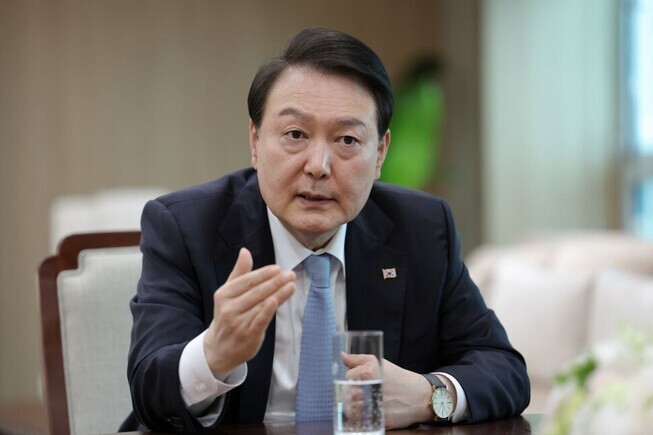hankyoreh
Links to other country sites 다른 나라 사이트 링크
Ruling party rushes to defend Yoon from his own comments

Controversy continues to brew over President Yoon Seok-yeol’s interview with the Washington Post in which he stated that he cannot “accept the notion” that Japan “must kneel because of our history 100 years ago.”
The presidential office and the ruling People Power Party (PPP) have tried to calm the furor caused by this statement by claiming that the president was echoing sentiments expressed by former President Kim Dae-jung. But their efforts have failed to put a damper on the backlash over the comments.
After claiming that the president’s words were a “mistranslation,” the ruling party was put in an awkward position when the journalist who wrote the article published Yoon’s remarks in the original Korean.
A senior official from the presidential office currently in the US as part of Yoon’s state visit tried to explain Yoon’s remarks by saying, “[He] meant that, in a situation where security cooperation is at stake, it is difficult to accept the argument that if [Japan] does not kneel [for forgiveness], the relationship between the two countries can never improve, or that the two countries can’t do anything [together].”
The official argued that the president’s message was that improving bilateral relations with Japan “couldn’t be delayed any longer for the sake of the country.” Invoking the attempt to normalize relations with the joint declaration in 1998 by President Kim Dae-jung of South Korea and Prime Minister Keizo Obuchi of Japan, they framed Yoon’s remarks as meaning “it would be foolish to nullify a 1,500-year history of cooperation and exchange because of an unfortunate period that only lasted for 50 years.”
When Yun Jae-ok, floor leader of the PPP, was asked on Tuesday to comment on Yoon’s interview with the Washington Post, he stated, “In 1998, former President Kim Dae-jung made a similar statement in his speech to the Japanese parliament, explaining the inevitability of improving relations with Japan in a serious and difficult national security situation.”
While it is true that Kim did express such sentiments in his Oct. 8, 1998, speech to the Japanese parliament, he also stated that “the time has come for the two countries to look squarely at our past and establish future-oriented relations.”
“Japan needs true courage to squarely face the past and to acknowledge the power of history,” Kim said, “while the Republic of Korea must correctly assess Japan’s changing attitude and find hope for future possibilities [in bilateral relations].”
Unlike Yoon’s comments, which include no mention that the Japanese government should reflect on its past, Kim clearly emphasized that the Japanese government should “squarely face the past.”
The PPP embarrassed itself while trying to save Yoon’s face by claiming that the Washington Post mistranslated Yoon’s comments. Yoo Sang-bum, senior spokesperson for the PPP, brought up claims that the subject of the verb “cannot accept” in Yoon’s interview was the Japanese government, not the president.
In response, Washington Post reporter Michelle Ye Hee Lee, who conducted the interview, released the original text of Yoon’s remarks on her Twitter page on Tuesday. The released text clearly shows that Yoon was referring to himself when he said: “I can’t accept the notion that because of what happened 100 years ago, something is absolutely impossible [to do] and that they [Japanese] must kneel [for forgiveness] because of our history 100 years ago.”
The Democratic Party has blasted Yoon’s comprehension of history that appears to exonerate Japan of its past deeds.
In a written briefing, party spokesperson Park Sung-joon called on the president to “give a direct apology and correct his perception of South Korea’s history with Japan.”
By Shin Min-jung, staff reporter; Kim Mi-na, staff reporter; Lim Jae-woo, staff reporter
Please direct questions or comments to [english@hani.co.kr]

Editorial・opinion
![[Column] Park Geun-hye déjà vu in Yoon Suk-yeol [Column] Park Geun-hye déjà vu in Yoon Suk-yeol](https://flexible.img.hani.co.kr/flexible/normal/500/300/imgdb/original/2024/0424/651713945113788.jpg) [Column] Park Geun-hye déjà vu in Yoon Suk-yeol
[Column] Park Geun-hye déjà vu in Yoon Suk-yeol![[Editorial] New weight of N. Korea’s nuclear threats makes dialogue all the more urgent [Editorial] New weight of N. Korea’s nuclear threats makes dialogue all the more urgent](https://flexible.img.hani.co.kr/flexible/normal/500/300/imgdb/original/2024/0424/7317139454662664.jpg) [Editorial] New weight of N. Korea’s nuclear threats makes dialogue all the more urgent
[Editorial] New weight of N. Korea’s nuclear threats makes dialogue all the more urgent- [Guest essay] The real reason Korea’s new right wants to dub Rhee a founding father
- [Column] ‘Choson’: Is it time we start referring to N. Korea in its own terms?
- [Editorial] Japan’s rewriting of history with Korea has gone too far
- [Column] The president’s questionable capacity for dialogue
- [Column] Are chaebol firms just pizza pies for families to divvy up as they please?
- [Column] Has Korea, too, crossed the Rubicon on China?
- [Correspondent’s column] In Japan’s alliance with US, echoes of its past alliances with UK
- [Editorial] Does Yoon think the Korean public is wrong?
Most viewed articles
- 1‘We must say no’: Seoul defense chief on Korean, USFK involvement in hypothetical Taiwan crisis
- 2[Reportage] On US campuses, student risk arrest as they call for divestment from Israel
- 3[Column] Park Geun-hye déjà vu in Yoon Suk-yeol
- 4‘Weddingflation’ breaks the bank for Korean couples-to-be
- 5Korea sees more deaths than births for 52nd consecutive month in February
- 6N. Korean delegation’s trip to Iran shows how Pyongyang is leveraging ties with Moscow
- 7Amnesty notes ‘erosion’ of freedom of expression in Korea in annual human rights report
- 8Will NewJeans end up collateral damage in internal feud at K-pop juggernaut Hybe?
- 9N. Korean hackers breached 10 defense contractors in South for months, police say
- 10[Guest essay] The real reason Korea’s new right wants to dub Rhee a founding father